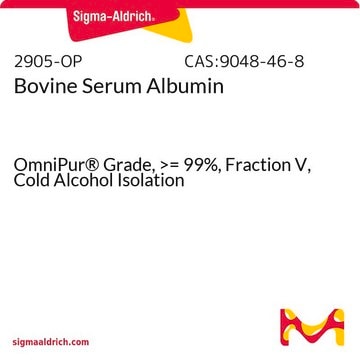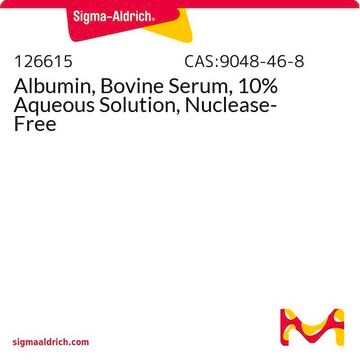B4287
Bovine Serum Albumin
heat shock fraction, protease free, suitable for hybridization, pH 7, ≥98%
Synonym(s):
Albumin bovine serum, BSA, Bovine albumin
About This Item
Recommended Products
biological source
bovine
Quality Level
grade
for molecular biology
product line
BioReagent
Assay
≥98%
form
lyophilized powder
mol wt
~66 kDa
purified by
heat shock fractionation
packaging
poly bottle of
origin
USA origin
technique(s)
ELISA: suitable
electrophoresis: suitable
western blot: suitable
pH
7
solubility
water: soluble (40 mg/ml)
UniProt accession no.
foreign activity
Protease free
storage temp.
2-8°C
Gene Information
bovine ... ALB(280717)
Looking for similar products? Visit Product Comparison Guide
Application
Biochem/physiol Actions
Features and Benefits
- Protease free
- Suitable for blocking non-specific protein binding sites in hybridizations
- Heat shock fractionated
Preparation Note
Storage Class Code
11 - Combustible Solids
WGK
WGK 3
Flash Point(F)
Not applicable
Flash Point(C)
Not applicable
Personal Protective Equipment
Certificates of Analysis (COA)
Search for Certificates of Analysis (COA) by entering the products Lot/Batch Number. Lot and Batch Numbers can be found on a product’s label following the words ‘Lot’ or ‘Batch’.
Already Own This Product?
Find documentation for the products that you have recently purchased in the Document Library.
Customers Also Viewed
Our team of scientists has experience in all areas of research including Life Science, Material Science, Chemical Synthesis, Chromatography, Analytical and many others.
Contact Technical Service



